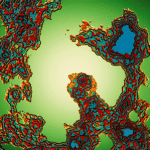Recent research has indicated a role for endocannabinoids in endometriosis and related diseases.
A study published in Frontiers in Oncology sought to determine whether endometrial cancer could be predicted by someone’s levels of the two canonical cannabinoid receptors (CB1 and CB2) and three related fatty acids (anandamide, OEA, and PEA). The researchers found a tendency for increased endocannabinoid levels among cancer patients. But there was little change in CB2 expression and a decrease in CB1 levels. The higher levels of anandamide and PEA in blood plasma could be one biomarker of endometrial cancer that doesn’t require an invasive biopsy, the researchers suggest. Unfortunately, the scientists don’t mention the timing of their blood collection. The endocannabinoid system makes up one part of the body’s natural clock — the circadian rhythm. Simple activities like singing or running can significantly change endocannabinoid levels in the plasma. Although this new research is promising and worth following up, it may be difficult to standardize measurements to find the proper “baseline” level of anandamide and PEA for a cancer diagnostic.
Read study: Identification of Novel Predictive Biomarkers for Endometrial Malignancies: N-Acylethanolamines
Adrian Devitt-Lee is a research scientist and longtime Project CBD contributor. © Copyright, Project CBD. May not be reprinted without permission.







